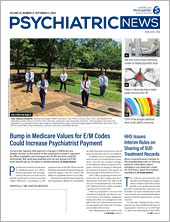When Jennifer Payne, M.D., spoke with her doctor about how to prepare for pregnancy, she asked when she should stop her medications for asthma. Her doctor responded with a laugh and said Payne shouldn’t stop taking the drugs because “oxygen is awfully good for babies.”
Now, Payne has an analogous message for her patients and fellow physicians as well: Maternal mental health is awfully good for babies.
Payne is an associate professor of psychiatry and behavioral sciences and the director of the Women’s Mood Disorders Center at Johns Hopkins Medicine. Last year, she offered her expertise on pregnancy and mental health during an advisory work group meeting for the Mind the Gap initiative. Mind the Gap was convened by Postpartum Support International (PSI) in partnership with The Reilly Group, a public affairs firm, and more than 25 national organizations, including APA.
PSI is an international nonprofit dedicated to helping women and families with perinatal mood and anxiety disorders. It is leading Mind the Gap, which is composed of leaders from professional and advocacy organizations, all working toward the shared goal of improving the mental health of women before and after they give birth. In April, PSI released the report “Mind the Gap: A Strategic Roadmap to Address America’s Silent Health Crisis: Untreated and Unaddressed Perinatal Mental Health Disorders.” The report summarized the Mind the Gap initiative and outlined the nine actions that the advisory work group identified to achieve its goal across the nation.
“Mental illness is incredibly common during a woman’s reproductive years,” Payne said. “Right now, the knee-jerk reaction is often to take a woman off her psychiatric medications when she gets pregnant, which is absolutely contraindicated by the data we have.”
Every year, approximately 600,000 women experience perinatal depression related to a live birth, and the total numbers are likely much higher when including other mental health disorders, according to the Mind the Gap report. “If that number is adjusted to include women who suffer a miscarriage or a stillbirth, the figure rises to about 900,000 per year,” the report continued. “Multiple research studies have found that depression is most common during the perinatal period, and women are more likely to develop depression during the first year following childbirth than at any other point in their lives.
“Multiple studies have found that a mother’s mental health status has a significant, long-term effect on the physical and emotional development of her infant,” the report stated. It also noted that fathers are at risk for postpartum depression, and their risk increases when the mother experiences perinatal depression.
The report outlined the five shared priorities of Mind the Gap related to perinatal mental health, including raising public awareness of the importance of mental health during and after pregnancy; ensuring screening is universal, standard, and routinely provided; improving public and private access to and coverage of treatment; providing perinatal mental health education and training; and supporting and promoting research.
Additionally, the report highlighted the actions that the work group identified to advance the five priorities. Those actions include implementing a national public awareness campaign on perinatal mental health, advocating for increased federal funding for research and public health interventions, and advocating for public policies that integrate and extend perinatal mental health care to improve outcomes.
“The advisory group was like a group of friends who all work in this area and had been on the clinical and research front lines,” Payne said. She said the organizers listened and took notes to create a concrete set of actions. “It wasn’t some pie in the sky, vague idea,” she said. “They actually talked to the people who are doing the work and asked us what we think should be done.”
The next steps for Mind the Gap include convening regional meetings to build awareness with a broad cross-section of stakeholders including policymakers, payers, and legislators; promoting model programs, best practices, and community resources for screening, referral, and linkage to treatment and services; advancing education and training for health professionals, community stakeholders, and peer-to-peer specialists; and holding regular conference calls and webinars on policy, legislation, and actions that the entire coalition can take.
Other goals including advancing a national campaign to raise awareness of the importance of women’s mental health during and after pregnancy and “amplify the voices of women and families with lived experiences,” said Wendy Davis, Ph.D., PSI’s executive director, in an email.
“Maternal mental health sets the stage for children’s mental health, behavior, and health outcomes for the rest of their lives,” Payne said. “If you can impact maternal mental health in a positive way, you can impact everybody.”■
“Mind the Gap: A Strategic Roadmap to Address America’s Silent Health Crisis: Untreated and Unaddressed Perinatal Mental Health Disorders” is posted
here.

